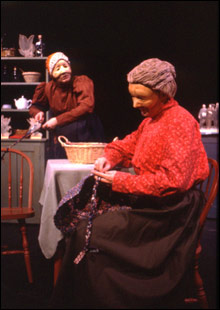
DELIGHTFUL: Recreating interactions. |
Born and raised in South Berwick, the writer Sarah Orne Jewett spent her life noticing the lives of ordinary Maine people. Her esteemed 1896 The Country of the Pointed Firs is a series of wise, gentle sketches of the aging folks of several small maritime villages. Pontine Theatre's M. Marguerite Mathews and Greg Gathers perform a lovely original adaptation of her book at the West End Studio Theatre, in Portsmouth.The narrator, played by Mathews, is a visitor to Dunnet Landing, where she lodges in the home of widowed Mrs. Todd, who is much in demand for her herbal remedies. Mrs. Todd kindly draws her lodger into the community: Mrs. Todd's mother and bachelor brother on Green Island; old Captain Littlepage, haunted by a ghostly seafaring tale; Elijah Tilley, a widower of eight years who talks of little besides his deceased; local social luminary Mrs. Fosdick, who "just knew how."
Mathews and Gathers pay homage to Jewett's portraits using Pontine's signature aesthetic of simple, classical stagecraft: The actors slip in and out of masks and costumes, and hand-hewn wooden dolls and cut-out images alight from baskets to the tops of tables. Mrs. Todd is sometimes played by Gathers himself, in a pink shirt, mask, and yarn wig, and other times by a doll in matching costume, maneuvered by Gathers with wonderful skill and reverence. In a particularly delightful scene, both Gathers and Mathews wear masks and skirts, and create a boisterous rapport between Mrs. Todd and Mrs. Fosdick, reminiscing.
Simple things are hallowed in these tales and in this production. As they chat, characters knit, pour tea, and braid rugs; talk is in vernacular, of mackerel and pennyroyal; set pieces are clear blue bottles, tea cups, and New England cabinetry. When the narrator travels with Mrs. Todd to a family reunion with baked goods galore, baskets of heart-shaped cookies are passed among the audience: For a few moments we share the scent and camaraderie of gingerbread.
Through the joy and sweetness of these sketches, recurrent is the theme of decline: Captain Littlepage tells of the "terrible loss" of shipping in these towns; Elijah Tilley laments how few "seafaring folks" there are these days. Villagers age and pass on, and we do not hear of many young ones. Memories sometimes falter.
So Jewett's exquisite portraits are not mere nostalgia; for all their delicate beauty, they hold moments that can chill like a splash of seawater. Ways are ever ebbing away, our narrator knows — from an era, from a community, even from her own observer's life: "So we die," she writes, "in front of our own eyes." Jewett's mindful preservation, and Pontine's tender rendering of it, are a gift to life.
Megan Grumbling can be reached at mgrumbling@hotmail.com.